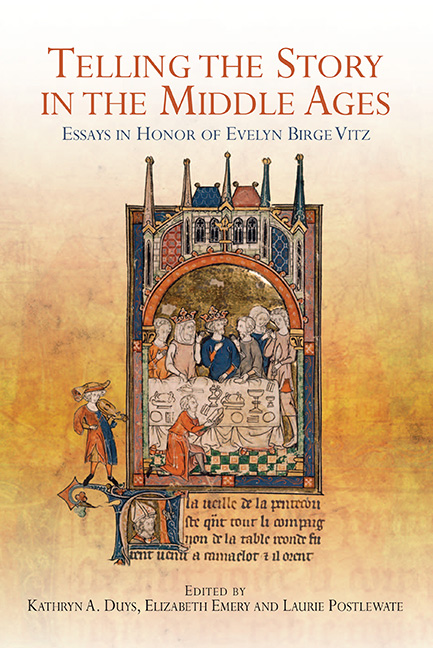Authorizing the Story: Guillaume de Machaut as Doctor of Love
Published online by Cambridge University Press: 17 June 2021
Summary
I first met Timmie Vitz in 1992, when as a graduate student I gave a paper on ‘Aural History’ in a Modern Language Association session that she and Nancy Freeman Regalado had organized. Timmie and Nancy swept me up into their joint passion for the study of medieval narrative performance, and I have benefited immeasurably, both professionally and personally, ever since. Timmie has been an endlessly kind and encouraging mentor and friend, her scholarship an inspiration, her pedagogical and website innovations a marvel. I have been very lucky to know Timmie and to have been her friend and admirer all these years.
Timmie's work has established the importance of ‘orality and performance’ in medieval romance. The fiddling, singing jongleurs she has evoked from the recorded texts of the twelfth through early fourteenth centuries find their corresponding visual texts in the performers depicted in many medieval manuscripts. In the first quarter of the fourteenth century, for example, a minstrel was shown standing outside a hall in which King Arthur feasts with his court (see Fig. 1). The liminal position of this figure seems deliberately to suggest both the storyteller who could have entertained the feasters in the tale, and his counterpart in real life, who would recite the story of Arthur's feast to a hall full of listeners.
By the time this picture was painted, performance had already begun to broaden out from the professional minstrel to include the literate household member who would prelect a written text to an audience (that is, read it aloud). The earliest visual metatexts associated with such material could have simply switched the performing minstrel for a clerk, servitor or family member reading to a group. But that didn't happen. Instead, the presence of the book seems to have directed illuminators to an entirely different iconographic tradition, that of academic lecturers prelecting to students. This essay concerns a particularly striking example of that hybridized imagery, one that imbues authorship with the auctoritas of the university master while empowering the lay audience with the freedom of vernacular patronage. In doing so, it elides didacticism with entertainment and lecture with story.
- Type
- Chapter
- Information
- Telling the Story in the Middle AgesEssays in Honor of Evelyn Birge Vitz, pp. 141 - 154Publisher: Boydell & BrewerPrint publication year: 2015

